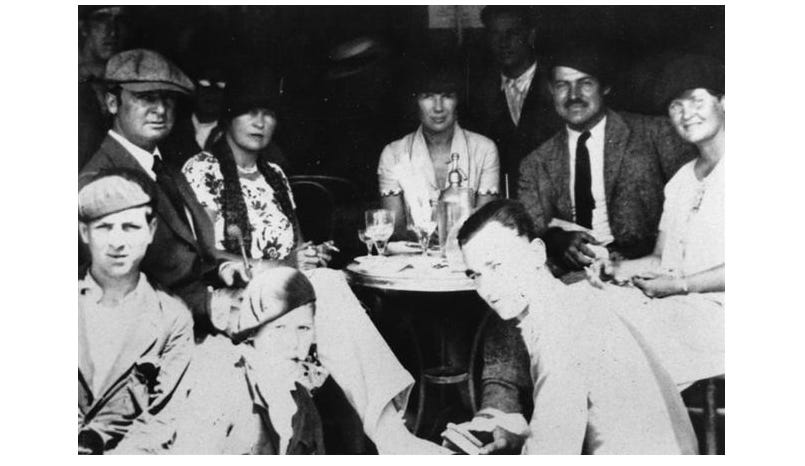Searching for True Words
"Once you’re doing things for truth’s sake, nobody can ever touch you again because you’re harmonizing with a greater power." - George Harrison
The Art of Alchemy is a reader-supported publication. Paid subscribers are receiving the audio version of this post as well.
Writing is a great way to test if you’re being honest with yourself. It’s simple, really. Just pay attention to whether you’re getting bored.
On the page, I can tell when I don’t speak my truth. I read the words and realize I’m no longer using my authentic voice.
Maybe I’ve fallen into a story to make myself feel better. Maybe I wrote what I thought people wanted to hear or would pay for. Maybe I wanted to make people laugh or make something go viral. Honestly, as soon as I start thinking about other people at all, things go downhill.
Hemingway wrote about moments of writer’s block in A Moveable Feast. “I would sit in front of the fire,” he mused, “and squeeze the peel of the little oranges into the edge of the flame and watch the sputter of blue that they made. I would stand and look out over the roofs of Paris and think, “Do not worry. You have always written before and you will write now. All you have to do is write one true sentence. Write the truest sentence that you know.” So finally I would write one true sentence, and then go on from there.”
I don’t have the roofs of Paris to look at, just a few trees and the brick wall of a dormitory. But I can relate. Over the past few years, there were countless times when I was so close to quitting.
I would hit a mental wall when all the writing felt lifeless, pointless, and circular. Sit and write some words. Hate the words. Go for a walk. Talk to a friend. Return to the writing. Sit with your thoughts. Delete it all.
I felt like a caricature, like the New Yorker who talks about leaving but never does, not knowing where they would go. I was always struggling, grinding, complaining, never finding the river’s flow. And I couldn’t figure out why I kept getting stuck in the tar pits of burnout.
A few months ago, it dawned on me that I had forgotten Hemingway’s advice. I was not writing true words. And thus I was boring myself. And if there is one cardinal sin in writing, it is to be boring.
What happens is fact, not truth. Truth is what we think about what happens. ― Robert McKee
Almost everything else you could get away with. You can offend people (sorry!), you can be wrong (aren’t we all?), you can embarrass yourself (sorry, not sorry!), but you cannot be boring.
You don’t need to be entertaining or flashy or intellectual or even funny (though being funny will excuse a lot of other shortcomings). But you have to be interesting, which is to say you must make an honest attempt at telling a small ‘t’ truth about the human experience. You have to show yourself.
If you do that, there will always be at least one person interested in the work: you.
This is simple but not easy. “Every man has reminiscences which he would not tell to everyone, but only to his friends,” Dostoevsky wrote. Even deeper, he explained, every man carries secrets he is “afraid to tell even to himself. … The more decent he is, the greater the number of such things in his mind.” These truths, the ones we’d rather avoid, are the ones that need to be told.
I was writing at the intersection of money and the search for a meaningful life. How on earth did I manage to make that boring?
Easy. The way you make any subject boring: by stripping it of its soul. Take something complex and treat it naively. Take something deeply human and pretend it is rational. Take something potent and pretend not to be affected by it.
Instead of exploring contradictions, you flatten it into a formula.
Instead of sharing your inner conflict, you sell a shortcut.
Instead of admitting confusion, you feign mastery.
Instead of going deep, you stay shallow.
Any topic has the potential to reveal truths as long as you refuse to make yourself invisible, as long as you refuse to hide behind untrue words.
But the untrue words are easier to say. Untrue words can be catered precisely for applause and profit. Untrue words don’t force us to look into the mirror for too long. Untrue words allow us to live on the surface of comforting illusions. But the sparks of truth dwell in the depths. You make a living with untrue words and only years later realize that you “destroyed and betrayed yourself for nothing,” as Dostoevsky would have said.
To write a true sentence, you first need to find a spark of truth.
Here’s one that took me forever to find and even longer to accept: finance bores me.
Finance organizes and channels one of the most important energies of our world, the energy of money. Finance offers an infinitely complex (and financially rewarding) puzzle — but it’s not my kind of puzzle. My mind works with words and sounds, not with oceans of data.
Finance, I finally accepted, bores me. Money on the other hand — money fascinates me.
Money is a funny thing. Money does funny things to us. Money makes us do funny things.
Money is also a very serious thing. Money can be the difference between freedom and servitude, even between life and death.
Philosopher Jacob Needleman called money the “chief representative” of “life on earth,” meaning the material realm. And in our secular society, that’s the realm we focus on. In our world, money touches everything, permeates every relationship, and has been woven into every layer of the fabric of life. That makes money a most intimate matter and one of the few remaining taboos. Money is a space holding some of the truths that Dostoevsky believed we hide from ourselves.
And money is where I slipped into untrue words.
Money's easy to make if it's money you want. But with few exceptions, people don't want money. They want luxury and they want love and they want admiration. ― John Steinbeck, East of Eden
I’ve spent much time trying to understand my past. My strengths and interests had been languages, music, and writing — not math. Yet I decided to get a business degree and spent a decade working in finance. A couple of years at a global bank followed by years catering to New York’s ultra-wealthy and advising institutional investors. Why did I end up there? Why did I stay?
The answer, of course, is money. But to find true words, we have to go a few layers deeper. Some of it, I blush, comes down to “daddy issues.”
When I was a child, my father was building a company selling computers and software to Germany’s Mittelstand companies. I didn’t see him much during those years and it took much inner work to understand the contradictory drives that came out of this.
First, there was an obvious desire for connection. Part of me wanted to be like Dad. He was interested in business and if I entered that world, we’d have plenty to talk about. Easy. This nebulous idea was enough for me to squash any desire to study something else. History, linguistics, literature, none of these could hold a candle to ‘being in business’ and therefore being more like Dad.
Another part of me hoped that quick financial success would give me more of his attention, admiration, and, dare I say, more expressions of his love. Dad had sacrificed much to pursue success at a young age but had lost his treasure in another venture. Could I restore a version of this dream for him?
To be clear, these were my inner processes. My father didn’t ask or encourage me to get into business. He wanted me to be happy. But our conversations revolved around success and business (and books, thankfully). That’s what made his eyes light up. So that’s where I wanted to go.
Finally, there was an entirely different motivation. Part of me carried a heavy weight of unexpressed anger. This part resented my father for pursuing his dreams at the expense of the family. And what better way to pay him back than making more money, at a younger age, and more elegantly?
If Dad had been breaking his back building a company, I would get rich wearing a custom-tailored suit, manipulating numbers in an office overlooking the nerve center of the financial world. Screw all the hard work, I thought. I would take a shortcut. I was going to use my mind and learn the magic of manipulating capital. I was going to be a master of the universe purely out of spite. Take that, Dad!
In retrospect, I can only smile at my naïveté. But these were very real unconscious processes that directed me. And until I shed some light on them, they kept me on my path, despite all misery and missteps.
Until you make the unconscious conscious, it will direct your life and you will call it fate. ― Carl Jung
I wanted money, yes. But what I really wanted was what money represented. I wanted to be released from the inner demons I didn’t dare to look at. I wanted to relinquish the emotional debt buried in my depths.
I couldn’t do any of that until I started the search for true words. That’s what I still hope to do here: Find a few true words and explore the mysteries of money and meaning, one true sentence at a time.






Dang! This is a fine example of “honest” and “brave” and really moving!
Thank you kindly.
Thank-you for your vulnerability.